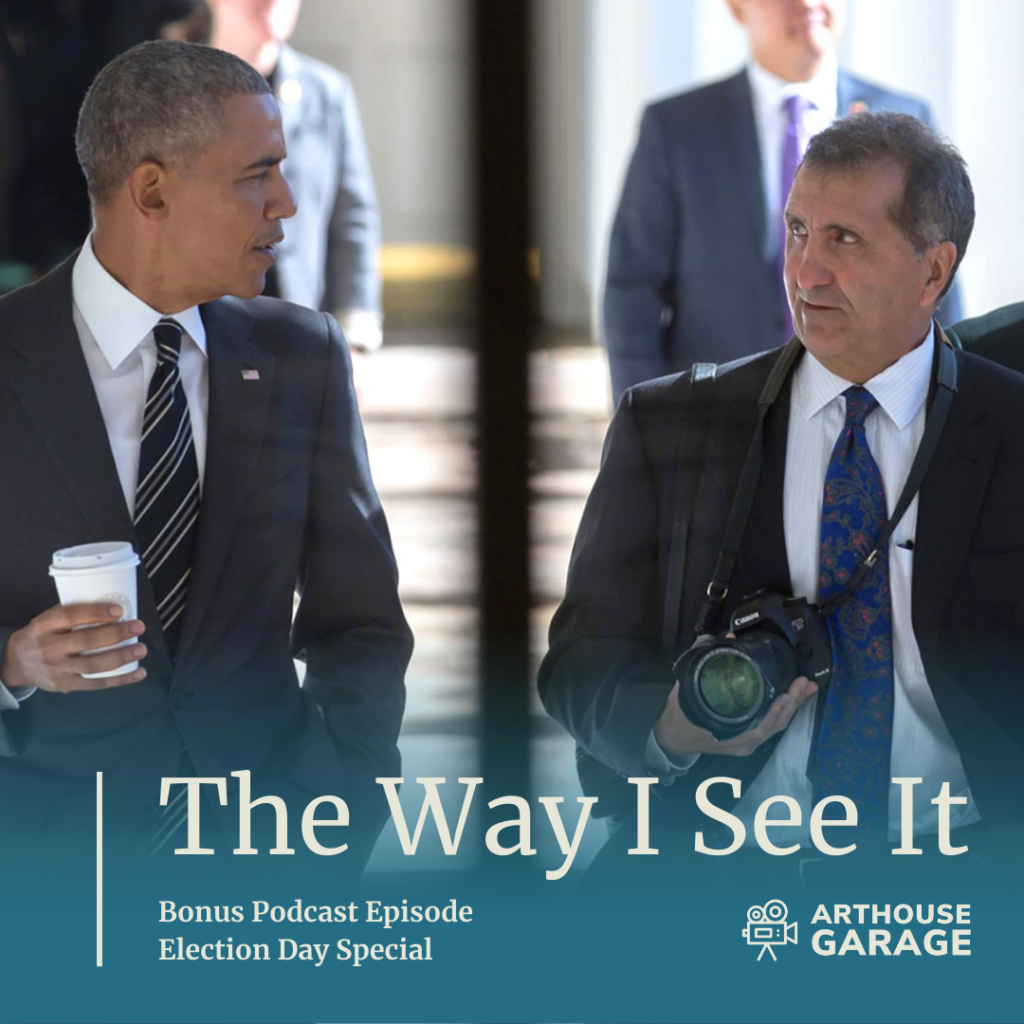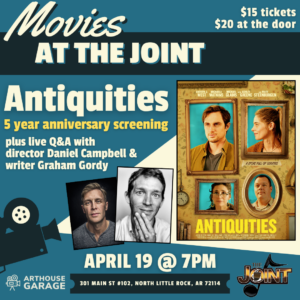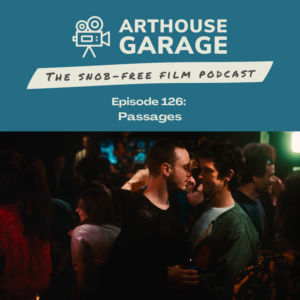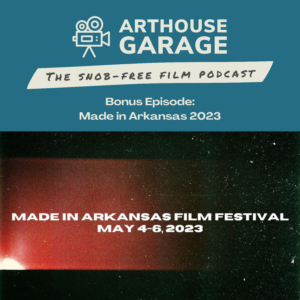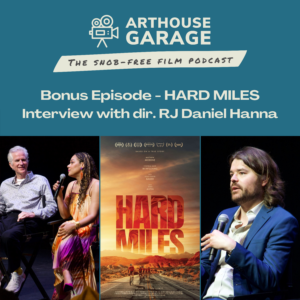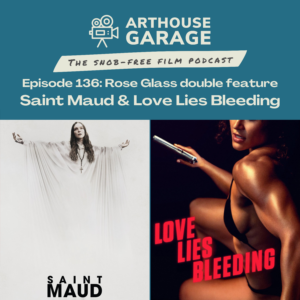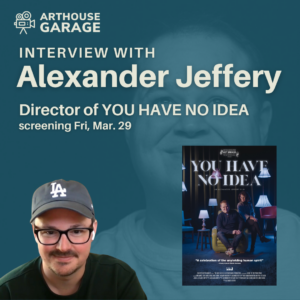Read the transcript below:
Andrew Sweatman 0:08
Hello, hello and welcome to a special election day bonus episode of art house garage, the snub free film podcast where we make art house indie classic and foreign cinema accessible to the masses. I’m your host, Andrew swepson. And you are listening to the election day 2020 special. This episode is coming out November 3 2020. So if you haven’t yet, by all means, go vote. You can listen to this podcast while you wait in line at the polls. Unless of course you’re one of the record number of people who voted early this year. Today’s film is a new documentary called The way I see it, which focuses on White House photographer Pete Souza. Pete Souza was the photographer during the Reagan administration and during the Obama administration. And he’s become very active on Instagram since Trump was elected. The documentary follows all of this with the greatest focus on Barack Obama. I would not call this film non partisan, but it does look at both Reagan and Obama. And it focuses more on the people than the politics. It is absolutely fascinating. And it’s surprisingly emotional. I was lucky enough to watch it at the drive in for filmland 2020 from the Arkansas cinema society here in Central Arkansas. But it is now streaming for free on NBC new streaming service, which is called peacock. My guest today is filmmaker Chad Hill, director of the recent short film invitation, which I reviewed very favorably on ID TV recently. It’s an Arkansas filmmaker. Chad is an incredibly nice guy, talented filmmaker, and he’s very thoughtful when it comes to cinema. Welcome to the podcast, Chad Hill.
Chad Hill 1:49
Hi, Andrew, thank you for having me.
Andrew Sweatman 1:51
It’s great to have you. And I met Chad just earlier this year, through Arkansas cinema society through film land, his short invitation was selected. And it was one of my favorite shorts of the of the festival. I’ll let you talk about it. But basically, it’s it’s set in a church which I always always like that kind of when a when a film is there certain expectations that come along with like being inside of a church building, right. And so when a film kind of plays with that, I always really enjoy that. This film does that. It’s very funny. It’s very sweet. It’s very into being very touching. So yes, I wholeheartedly recommend invitation. Tell us about your film. And what’s the progress on it right now? Yeah. So invitation tells a story of a pastor Paul, who, at the end of his church services, given the altar call and he has this a very emotionally distressed man come to the front and start spilling his guts all over the place and just generally making making everybody very uncomfortable.
Chad Hill 2:51
And right now it’s still still playing a couple festivals. It’s got a couple festivals coming up next month to play but after which pointed the may put it online to see for free.
Andrew Sweatman 3:04
Well, cool. Well, in the event that that happens. I will definitely link to it. Yeah, that that we performance from the the person or I guess co lead? I’m not sure. The person?
Chad Hill 3:13
Yeah, Adam Duncan.
Andrew Sweatman 3:14
Yes, I’m talking. That’s his name. He’s hilarious. It’s a perfect, you know, it’s perfect mixture of like, you really pity this guy. You’re also really uncomfortable. You kind of want him to stop, but it’s also really funny. So anyway, it’s, it’s a great film. So once that is available, I will definitely link to it on Facebook and all the places I can. Do you have anything else in the works? Anything coming next?
Unknown Speaker 3:35
Yeah, so I’ve kind of been trying to get a short film my next short shot over the course of the last year, but you know, obviously due to COVID. And everything, it’s been difficult to set anything up. But right now I’m eyeing to shoot it in the next year. It’s a title is called How do I tell you this? And it’s, it’s a romance. So I’m hoping to be able to launch a crowdfunding campaign for that soon.
Andrew Sweatman 4:05
Well, that sounds great. And as soon as that is also, you know, available for crowdfunding and whatever else, I’ll definitely link to that as well. Hopefully some archives garage listeners can can support local film. Love it.
Unknown Speaker 4:19
Yeah.
Andrew Sweatman 4:20
Well, cool. Let’s then jump straight into talking about today’s movie. The way I see it. I know what happens in the Oval Office. And
Unknown Speaker 4:31
that’s what scares me.
Unknown Speaker 4:33
I come at this from a very unique perspective.
Unknown Speaker 4:37
Not just having been a journalist but also having worked for two different presidents. Pete was with the president all the time. Unlike his predecessor, Mr. Trump does not allow his staff photographer to capture photographs of life and work inside the White House. If
Unknown Speaker 4:59
you just stacked up the image of the Obama presidency in the Trump presidency, you would see the two stories of America in the starkest possible contrast.
Unknown Speaker 5:09
The job of the chief official lapse photographer is to make authentic photographs. Photographs break down the idea that these people are somehow different from us. I’ve got an idea for another picture. Get that piece. Yeah. The first time that we went to the UN, he and Reggie love played basketball at one point prison about blocks Reggie shot. And he goes, did you get that block?
Andrew Sweatman 5:37
All right, well, let’s talk about the way I see it. So this is a documentary from this year, that follows a former White House photographer Pete Souza, he worked for the reagan White House, and then he worked for the Obama White House. This follows his personal story of how he got into this job, his experiences working in the White House, but follows a lot of the milestones of the Obama presidency. And then it kind of goes into the way that Pete Souza has started using his platform and his voice during the Trump presidency. So there’s a lot of kind of layers to this, and I wanted to talk to you about how you think it works, you know, as a film as a historical document, but then also as a piece of activism. So on a recent episode of this podcast I was talking with, oh, Maya Jones. And he had just seen this and mentioned it, and we talked a little bit about it. And that he was a little bit mixed on how you know how effective he thought it would be as kind of from an activist standpoint, and there’s been all these things this year, kind of you can tell they kind of rushed to get ready to get this out before the election, I guess, because it’s the most relevant then. But also, they’re hoping to sway voters minds. I watched the comi rule on Showtime, which is it talks about it depicts FBI Director James Comey in his interactions with Donald Trump. And then there’s this documentary, even something like bore at two, which just came out the other day kind of fits into that category category of politically charged things in this very politically charged time. And we’re recording this. Actually daftar we have a new
Unknown Speaker 7:09
Yeah. It’s a week. Yeah, it’s a week out from the election. Also,
Andrew Sweatman 7:14
week before the election. We just had a new Supreme Court Justice sworn in yesterday. So yeah, politics is on a lot of people’s minds. What do you think about this as far as how effective it works as a piece of activism?
Unknown Speaker 7:25
Yeah. So it’s actually kind of a complicated question to consider for me too, because I suppose in order for something to be considered, you know, a form of activism, you kind of have to have a cause to rally behind like a certain goal and to be both reductive and simple. Is it the impression you might get if you consider the film just on its own, that cause that it has was mainly that this current president stinks. And we need to get rid of him? Which is, is a fair, you know, that’s a fair test. But as far as like a specified go, it feels like kind of a baseline form of activism. And I, for me, I think the film itself is more interested in Pete Souza himself as an activist, I get the sense, from watching the film, that there’s a question hanging over the whole thing is what radicalized him? You know, because there’s a point brought up in the documentary at some point that pizza is a being a career photo journalist. This is a profession where an unbiased lens and being able to consider the bigger picture and you know, just to document things, as you see it is is, is very valuable. It’s the most valuable thing that you can have. And so just by the nature of he even admits at one point, the documentary documentary that in his criticism of President Trump, he’s essentially made himself unemployable and is in his own field now. So I think the more interesting question to me is what made Sousa an activist and I think what we get the picture over the course of the whole film is simple. The simple fact that what he saw in the office of the president when Obama was in office was this portrait of a of at his core, a good man. And, obviously, it all viewers are going to bring their own feelings about Obama and that administration to the film that may interfere with that assessment, you know, bringing their own feelings into this but as far as like, what we were being presented with is just pizza is his perspective. And it’s, it’s very powerful because you really get the sense that he really got to know this guy and got on, fettered on. I’m sorry. What’s the word unprecedented access to Due to the office of the president and what he saw, there was something that just fundamentally changed him.
Andrew Sweatman 10:06
Yeah, I agree. I think that for me, I mean, I found it really moving, and we can talk about that. But I think just on its face, what he does what Pete Souza does with his Instagram, which is kind of what it shows, I guess we should explain it for people who haven’t seen it, basically, since the Obama presidency ended, Pete Souza, started instagramming. And he would just post something that was kind of the antithesis of whatever Trump was doing that day, and actually speaks volumes. That’s really powerful.
Unknown Speaker 10:36
Yeah, specifically, what he would do is typically kind of calling back to the the internet meme. There’s a tweet for everything with regard to President Trump. And you know, what he’s talking about? He would take what he would take the most recent tweet that the President made, and he would post a picture from the Obama presidency that kind of showed a counterbalance do whatever he was tweeting about.
Andrew Sweatman 10:58
Yeah. So I mean, that’s, you know, simple on its face. But that because he has so many images, so many powerful images of President Obama that yet it’s, it’s a really powerful way just to show those things side by side. And so the film kind of does the same thing. We see a lot of Obama and then, I mean, just comparing it to the news, we see every day, we could see the big difference. And and I so I think the film works on that level. And I guess the question that that got me thinking about was, you know, if someone who doesn’t like President Obama watches this, what are they gonna think? And so I tried to, like, put myself in those shoes. And I have no idea Honestly, I’m gonna guess it’s a matter of getting in front of their eyeballs. Which that’s half the battle, because there’s, there’s, you know, anti Obama movies in the theaters every few months to that. Not this year, because the theaters are closed, but that’s some whatever
Unknown Speaker 11:52
the latest dinesh d’souza joint is exactly
Andrew Sweatman 11:54
like that. I’m never gonna watch it. So I know, it’s it kind of goes both ways. And in a similar way. But I do think that if someone just happened upon this on MSNBC, which they aired it a couple weeks ago, and we’re having so watch, it is streaming now, by the way on peacock, that I think just seeing like President Obama interacting with kids and that kind of thing. It is, I find that to be really powerful. And I think that someone would be hard pressed to, to not find some, you know, something challenging to their worldview in, you know, if they’re a big supporter of our current president, I don’t know, it’s hard to say, but and then as far as what you were saying to about, it kind of shows what made Pete Souza kind of become an activist or start doing this. So I think one of the points made is like, you know, how effective is EFC? Just putting stuff on Instagram. And I think maybe the film kind of understands that view a little bit. Because I think instead of saying, hey, if you love Trump, here’s why you shouldn’t, this movie is more saying, if you’re afraid to speak up, here’s maybe here’s something that can empower you to do so. And I definitely had that feeling to you know, I don’t, I’m not very political on social media. I don’t talk about politics with people, but I think someone could watch this movie and feel more empowered to have those kind of conversations and and realize it, you know, it’s a big deal. And everyone has a voice. Even if you’re not even using your voice for politics, I think you can, you can kind of get just a general, don’t be afraid to speak up about something else. A totally other topic from this movie, I think you could kind of take that that message from it, too. So I think it works pretty well. Again, I think your mileage is gonna vary, depending on where you stand politically, you know, it’s as an msnbc film. If you like watching msnbc for your news, you’re gonna love this.
Unknown Speaker 13:47
Yeah. So yeah, yeah, I don’t see your avid Fox News watcher being terribly invested in the in this in seeing this movie, or at least giving it a fair shot. And, you know, that’s fair. And one of the things for me with the film is another question that I think it’s most interested in, you know, whenever you move away from just discussing pizza himself, who’s the main subject of the documentary, but, you know, there’s been a lot of discussion, particularly around, you know, the general continued conservative support for President Trump. And these are the kind of people you know, who tout themselves as, you know, the Moral Majority and sort of the the people who hold the government and hope our political figures to a higher moral standard who say versus jacks or something. Yeah, right. Exactly. But yeah, and so it’s, it is kind of a question that a lot of people been wrestling with, particularly, you know, when a lot of, you know, you have like Christian leaders step up and say, Oh, you know, we’re, we’re electing a president, we’re not electing Jesus, you know, and things like that as a justification. So it, it kind of comes back to this question of does it matter, that the President that the our leader You know, the highest office in the land is held by a good person. And I think that this, this film makes a very compelling case, that does matter. And, you know, kind of, and in making that, that case for it, I think it does a pretty smart thing, that will probably also frustrate a lot of detractors, of Obama, both, you know, on the left and on the right, you know, obviously, there’s plenty of conservative bias against Obama. But you know, there’s, there’s also plenty of people on the left who have their own some very strong criticisms of him on a policy front. And I think that the film mostly sidesteps any serious Polly policy discussion to just kind of examine the person. How, and, you know, we get these scenes of, I think one of the most touching scenes, and I can’t remember if you mentioned it already, but whenever Obama gets the news about Sandy Hook, is, and you get these images and stills of, you know, you see him react with that you see him react with genuine emotion and empathy, and a sense of care and respect for these people that he’s interacting with. And it’s just the kind of thing that it really does kind of get to you on a gut level. Yeah, and especially whenever it does bring in the, you know, pictures from the Trump presidency. But that’s, that should that is another thing that I want to bring up was just the absolute unlimited access that pizza had is just there’s so much material here, I feel like we only maybe scratched the surface of, I don’t know, maybe 1% of what he had available, just watching this documentary. And I think because you have so much of that material, because you have so much of that access, you really get a sense that, that when he was in front of the camera, and they mentioned this in the documentary, that he doesn’t really have a sense of the camera being there, he forgets that it’s there. And so you’re, you don’t feel like you’re watching a performance because I don’t the kind of emotion interactions that you see an exhibit? In a lot of these images. It couldn’t be rehearsed. Just it’s it comes from a real genuine place.
Andrew Sweatman 17:22
Yeah. 100%. And that’s one of the interesting things too, I think. So I’m not a photographer. But I think I’m curious to see like, what does a photographer think about this film, because he goes into the craft a little bit about, you know, he wants his images to be able to tell a story. And he talks about that access, and how important that was to him. And, and a lot of it is he, Pete Souza did some sort of tour where he showed he did a talk and showed several of these images. And some of them are really remarkable. So a lot of the there’s several moments in the film where we’re seeing an image, and he’s kind of explaining what was going on. And like you mentioned, on the Sandy Hook day, we have an image of Obama hearing that news for the first time, which is incredibly powerful. And then and so we’re getting a behind the scenes look then about what was going on. And then we see the news footage that we all probably watched, and we can see how emotional he is. And you know it, I think you’re right, it really is showing Obama, the man versus the politician is talking about his his presidency as from a political level, but just like Who was he as a person? Which I won’t get back to but but I think one of the interesting things too, is that Pete Souza, you know, he’s a lifelong photographer, he looks at some of the photos coming out of the Trump presidency, and he kind of breaks them down, deconstructs them and says, Okay, this is clearly staged. And he kind of explains why and, and just talking about, right, they
Unknown Speaker 18:48
Yeah, they are designed to project a certain image like that, like, that’s one of the things that I think you can’t argue regardless of what you think of the current president. I think you can’t argue that he is very obsessed with his own branding and his own image. And you see that in a lot of the images that come out of his white white house is that it’s very, is very structured, and it’s very constructed in a very particular way. And that’s something that you don’t get from Pete, Susan’s photography of Obama and anything, obviously, you have the craftsmanship of, you know, capturing a specific moment as a photographer, but as far as like the individual moments that we’re seeing, there’s like, there is no lack of reality to Hmm, yeah.
Andrew Sweatman 19:36
Yeah. And and he took so many photos, too. I think the output is hugely different than the current presidency, and so many that they were they were putting several of them online and then they have to explain what flicker is in the documentary because I don’t guess that’s a thing anymore. Yes, it was not. That’s funny. I was like, Oh, no flicker. That’s not a rapper. But then, like they also I thought that was a really cool thing. They had these prints of them put up They were changed out periodically in the White House. So that people that didn’t necessarily interact with him every day with the President could kind of see some of this behind the scenes what’s going on. And I can imagine that was huge for just like, morale at work kind of thing. That seems really cool. But But yeah, I think this is just kind of a way we can shift and just talk on the film level. I thought this really worked well, too. And I think I can somewhat based on the fact that, you know, you tell me, there’s a documentary about a photographer, a historical photographer, that doesn’t, that could sound maybe dry, or something like I wouldn’t be excited necessarily on the surface of hearing that. But this is so engrossing and so emotional, much more emotional than I expected. I cried a few times watching this. And not just at those big moments, like, with Sandy Hook, and the day that LGBT marriage, gay marriage passed, and kind of getting the behind the scenes looks at some of those, like big events, but also a moments with Obama and his daughter’s pizza is his own marriage. And then the the hand that a president obama played in that, which is really pretty remarkable. And just there’s a lot of just really sweet moments in this too. So yeah, what do you think? I guess? That’s a kind of a weird question. But on a film level versus on the political level, what do you think of this?
Unknown Speaker 21:18
Well, I mean, I think it’s, I think it is effective as a documentary. I mean, it’s, it’s very well and very well put together in terms of just again, like going back to, he had to have such such a high volume of stills and material to call from this area era. And I think they they make good choices as far as what to present us with as far as hitting those pivotal milestone moments. Another one that I can think of is, whenever we see the passing of the ACA, whenever he comes in and yeah, into the boardroom, and gets to talk to the all of the guests to celebrate with his staff, which is a really powerful moment. Yeah, I think. And I mean, it knows it knows what points to hit, it knows where its audience is going to be, is going to be hit. And I think it just, I think the most powerful thing about it is that it is a reminder. And for some people, maybe even just a new presentation of what we had before of trying to reassert what used to be normal and expected out of our leaders and out of out of our government. I should say, getting into some personal things, and I mentioned this in my own write up, is that, you know, my background I, during the Obama years, I personally was not terribly politically engaged in when I was I, I grew up in very conservative household. So it’s, I don’t have, I don’t have a great memory of the Obama years. For that reason, as far as you know, the individual policy stances and things that happened during that time and what it was like to see him as, as a president and as a leader. And, you know, again, not saying that this is an objective presentation of him as a figure and what that time was, but I mean, it’s just, it’s the kind of thing that echoes back to, you know, can you whenever you see Obama officiating the wedding of his photographer that follows him around all the time that they have formed, forged this bond and this friendship. And you see that that he has this genuine these genuine relationships with not just his family, but also his staff and the people that he interacts with every day and this level of respect, even for his opponents. And I just, you can you could you imagine any of that coming from the current president, and that is, that is an emotional thing. to, to receive. Like, it’s it’s very, just very powerful. Yeah.
Andrew Sweatman 24:07
Yeah, I agree. It’s so the film does other things. It looks a little bit at the reagan presidency, while he works. He worked with the Reagan’s, and then, you know, his or his early pizzas, early days of being a photographer, freelance photographer, and kind of his his career, and then at the end, it goes into the activism stuff. But I think we keep harping on the Obama stuff, because that really is the most compelling part of it. I think, yeah, just as a for me that the most powerful thing is just as a historical document, seeing Yeah, behind the scenes on on his presidency and, and then to some of the, so you know, I was maybe somewhat engaged at that point. But I’d certainly didn’t know anything about his his years before the White House. So if we see young Obama a little bit as, as he’s becoming a senator, and see some interviews there
Unknown Speaker 25:00
And we see and we see him take a trip to Kenya.
Andrew Sweatman 25:03
So I was gonna say he takes this trip and he visits this village, he does this, he and Michelle have this kind of symbolic age test that they take. And he has a speech in this village. And he’s saying, you know, if the American president can take this test, you can too and de stigmatizing it in that way. And, you know, you need to know how healthy you are. And that was just a really powerful moment to seeing him in that environment. And I didn’t know he did any of that. So that was, that was pretty cool. And that kind of just showed why he was so popular and beloved around the world, and not just in the United States. by so many. Right? Yeah.
Unknown Speaker 25:40
Right. I mean, it’s that thing of the thing that I always hear about leadership is you lead by example. And that’s, that’s a great case, like even early on in his career when when he was doing exactly that. And we see many other examples throughout this film of that. Yeah. And I know that I know that we spent a lot of time praising Obama on this, I don’t want to pretend like this is this is a film that completely lionized him. But I mean, it’s, it’s presenting a certain a specific individuals perspective of what, what he saw and what he sees in this in this presidency and the bond that he formed. And I think that’s the lens that we have to think, you know, I can definitely see complaints. We’ve talked about who the audience for this is, and we expect would enjoy this. And I think, you know, any accusations of, you know, political bias or whatever, gonna kind of miss the mark, of what the point of this film is,
Andrew Sweatman 26:37
you know? Well, I completely agree. I think this is definitely I mean, one of the best things I’ve seen this year, it’s one of the best documentaries I’ve ever seen. Probably not, but I think it’s really strong, and definitely worth watching. Yeah, again, depending on maybe depending on where your politics lie. But I think it is a really effective piece of cinema. So I think it’s a at the very least, it’s going to be an encouraging thing to watch to to get the people excited to go out and vote. Yes, it will be really interesting to, to watch this movie, you know, months down the road, depending on how things go with this election. Anyhow, that is the way I see it. That is available currently to stream on peacock, which is that new, strange new NBC streaming service that but I think it’s free to get to watch there with a few ads at the beginning. So you can catch this pretty easily on demand. Sounds like we both recommend it. Yes. Yeah. Such a
Unknown Speaker 27:34
such a strange name for a streaming service is like,
Andrew Sweatman 27:39
doesn’t exactly roll off the tongue. Yeah. So yes, yes, that is a that’s a strong recommendation from me. There you go. Me too. The way I see it now streaming, check it out. And thank you so much, Chad, for joining me for this episode. It’s been a pleasure to have Yeah,
Unknown Speaker 27:53
yeah, absolutely. Thank you. Thank you again for having me.
Andrew Sweatman 27:56
Yes. I’ll link to all your film stuff down the road when it’s available. And hopefully we can have you back on the podcast sometime soon.
Unknown Speaker 28:03
Yeah, I’d love to come back anytime.
Andrew Sweatman 28:05
Thank you listeners, so much for tuning in. Our house garage has a few years worth of episodes now and you can hear all of those in your podcast app of choice or by going to art house garage comm if you want to support our house garage, leave a rating or review in your podcast app. Or you can buy an art house garage t shirt at art house garage, comm slash shop. stay in the loop about art house garage and the Arkansas film community by subscribing to our email newsletter, which is at our house garage comm slash subscribe. You can also email me directly Andrew at our house garage COMM And of course follow on social media. You can find us on Facebook, Twitter, Instagram and letterbox. Just search at art house garage in all those places or find links in the show notes. That will do it for this episode. Until next time, keep it snap free.
Transcribed by https://otter.ai

